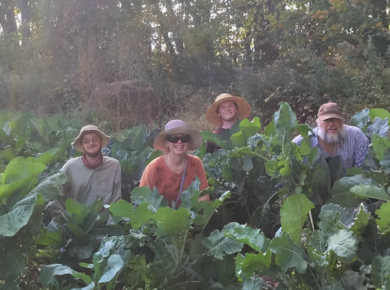Posted: January 24, 2024
You are invited! Join us for Climate Pollinators, a webinar series on creation care. See below!
Andre Wiederkehr, of Ontario, Canada, doesn’t have a driver’s license. That’s because he chooses not to use fossil fuels to get around.
Without using a car, attending Hanover Mennonite Church on Sundays means riding 21 kilometers by bike. “None of us is really an enthusiastic biker,” says Andre Wiederkehr, who lives on a farm with his brother and parents.
The question is: “Do we drive and continue the system which can’t be continued forever, so eventually there will have to be a break, or do we make the break now?”
Andre, his brother Theo and their parents have decided to make the break in numerous ways.
- On their 100-acre farm, they are working to swap out tractors and power tools for human-powered farming methods.
- They burn firewood instead of using a gas or electric stove, and let their wood stove double as a heater for their house.
- They grow most of their own food, eliminating the need for transportation.
- They use local building materials, like wood, as much as possible, instead of metal or cement.
The lifestyle they have chosen isn’t easy. The brothers work hard and sometimes feel isolated from friends and family. So how do they stay motivated, and what keeps them accountable?
“Most people hold themselves to some kind of moral standard,” Andre Wiederkehr says. “For me, I want to be a person of integrity, I want to be able to think well of myself.”
Andre Wiederkehr enjoys making tools for use on the farm, and he said he finds satisfaction in a job well done. He also said there’s something rewarding in “feeling that the thing you did, you’ve done in the right direction, in the right way.”
For Theo Wiederkehr, “The satisfying thing is… when I’m working with another species well. That happens most for me with our domesticated plants.”
Theo Wiederkehr owns a seed company and grows a wide variety of grains, including wheat. “We’ve had this relationship with this plant for 10 000 years of human history,” he said. “and it has shaped how our species has developed and we have shaped how its species has developed.”
“There is this enormous, strange satisfaction when you hold a sheaf of grain that you have grown and harvested in your hand,” says Theo Wiederkehr. “I felt it the first time I harvested.”
Modern society is structured around many systems that are harmful to the earth and to people. “Because of how our society has developed,” Theo said, “we end up in situations where there seems to be no good choice.”
For example, “Do we make a bad choice of travelling to church in a damaging way, or do we make a bad choice of not being part of that church? Neither really feels like a good option.”
For inspiration, the brothers turn to their Mennonite heritage. “Desire for integrity is something which is deeply ingrained in our faith,” Theo Wiederkehr says.
Andre provided an example: “I used to be really into robotics, and I do enjoy that a whole lot more than gardening at a brain-tickling level, but I don’t think I would feel good about my life if that was what I was doing right now.”
—Sierra Ross Richer is a member of Waterford Mennonite Church, Goshen, Indiana, USA. She is an intern with the Anabaptist Climate Collaborative (ACC). This story from the ACC’s Lent Climate Pollinator Series: Global Anabaptist Stories on Climate Change is reprinted with permission.
Click here for recordings from previous webinars:
- 17 October 2023 –Africa focus with Sibonokuhle Ncube
- 14 November 2023 —Asia focus with Nindyo Sasongko
- 12 December 2023 – Europe focus with David Nussbaumer
- 16 January 2024 – Latin America focus with Juliana Morillo
|
You are invited! Join us for Climate Pollinators, a webinar series on creation care. MWC’s Creation Care Task Force members from each region will host one hour of storytelling and Q&A. Church members from around the world will share how they are affected by climate change – and responding with resilient action and gospel hope. Other featured stories for the North America webinar Each webinar will take place at on Tuesday at 14:00 UTC (click here to find the time in your region). Register here: |




Join the Conversation on Social Media
FacebookTwitterInstagramFlickrYouTube